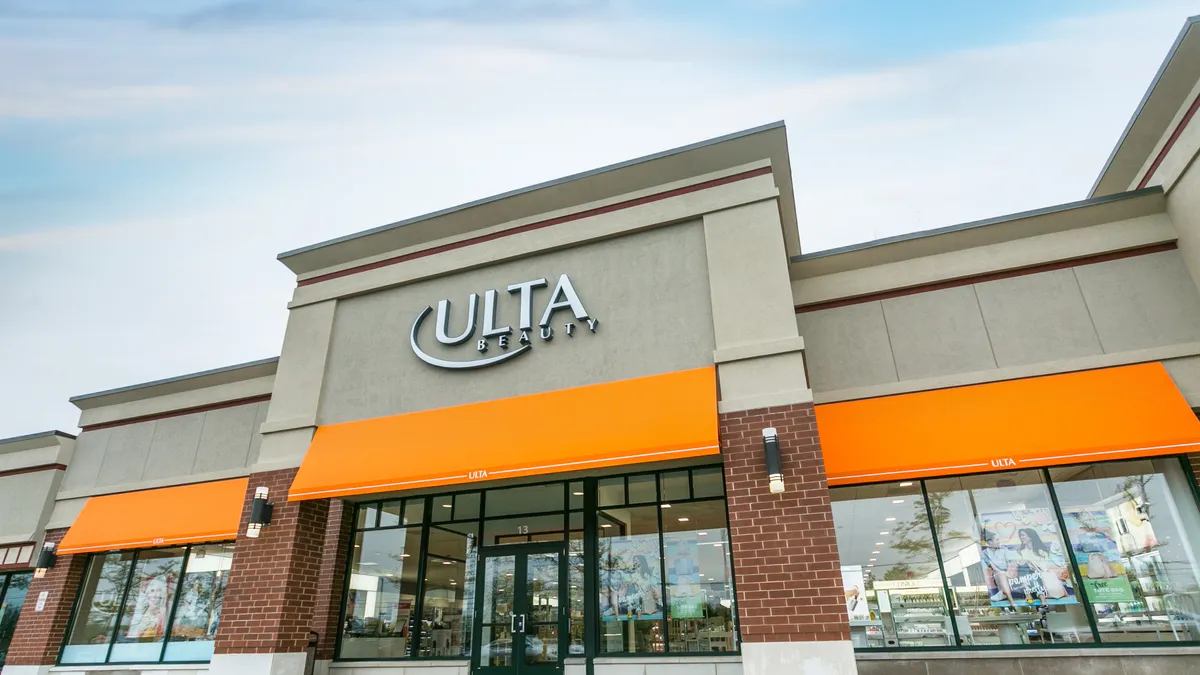Dive Brief:
-
Ulta on Thursday at its investor conference announced that it is building "a digital innovation ecosystem," thanks to an investment in e-commerce platform Spruce and the recent acquisitions of AI and augmented reality startups QM Scientific and GlamST.
-
The beauty retailer also announced that starting Nov. 17 Kylie Jenner's Kylie Cosmetics will be sold in Ulta stores, and beginning Nov. 25 Kim Kardashian West's KKW Fragrance will be exclusively sold at Ulta. Exclusive merchandise is key to the company's performance, making up 9% of its sales. Jenner herself has already touted the new ability for her fans to try out her makeup in person, they also said.
-
The company also refined its U.S. store target to 1,500-1,700 stores, with plans to open 80 stores next year, 75 stores in 2020 and 70 stores in 2021, according to a press release. Ulta also said it aims for a two-day delivery of e-commerce orders by 2021, supported by the opening of a "Fast Fulfillment Center" next year that will just serve online sales, as well as bringing ship from store through some locations, "with the goal of increasing inventory turns by 50 basis points over the next five years," according to the release. The retailer is now testing in-store pickup of online orders, CEO Mary Dillon told shareholders.
Dive Insight:
Ulta appears to be slowing its roll when it comes to brick and mortar, tamping down its previous plans to open 100 stores each year and switching to a greater focus on digital sales. To fund its investments, the company has embarked on multi-year $150 million to $200 million cost savings effort, according to its release.
The company's tech investments will serve to capitalize on rich data streaming from its loyalty program, and executives on Thursday said that personalization will be in focus. In the second quarter, the beauty retailer's loyalty program expanded to 29.5 million active members — a year-over-year increase of 15.5% — adding to its steady growth quarter after quarter.
Ulta's first acquisitions speak to a larger trend within beauty, a category that has been laser focused on technology as of late. Rival Sephora was one of the pioneers in the segment, with stores that showcase Color IQ technology, augmented reality tools like the Virtual Artist, which lets customers try on a given look or style, and iPads spread throughout the store. In fact, beauty as a segment has used technology like augmented reality so well that some analysts say it's one of the only sectors adding utility to the customer rather than just shiny objects. In that way, Ulta's acquisitions make a lot of sense for a retailer hoping to compete in a technology-heavy space.
Ulta is taking advantage of the loyalty program that it's built in order to stave off Amazon's advancement and retain the market share it's taken from legacy players, according to Pini Yakuel, CEO/Co-Founder of Optimove, who noted that beauty is the second most shopped category on Amazon, which can deliver those purchases in 24 hours in some areas.
"While your local neighborhood store can keep track of their few customers and get to know them personally, larger brands will need to rely on data and AI to achieve this human touch," he told Retail Dive in an email earlier this year. "That's personalization at-scale. We've seen Ulta learn this lesson — there's a reason the brand's loyalty program hit nearly 30 million last year."















